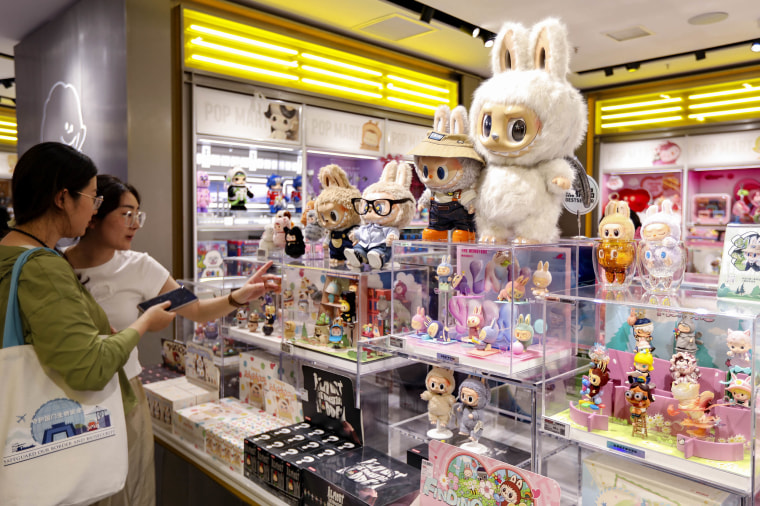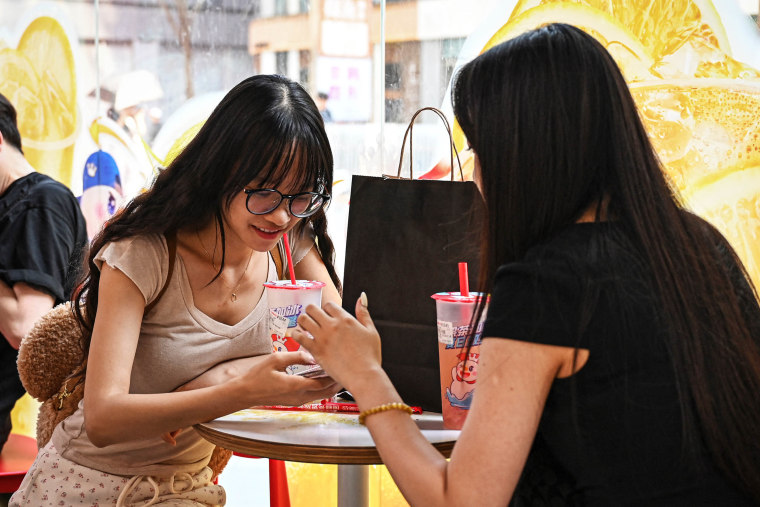Young Chinese consumers are spending to feel good amid slower economic growth

HONG KONG — Young people in China may not be buying cars or houses, but there’s always money for milk tea and toys.
It’s a challenging time to be a young person in China: The world’s second-biggest economy is growing far slower than it was when their parents were their age, with the U.S.-China trade war threatening to further weigh on growth. Competition for jobs is cutthroat and monthly youth unemployment stands at about 15% on average, with Chinese universities churning out a record 12.22 million new graduates this year.
Feeling “besieged” in life in the face of these economic obstacles, young Chinese consumers at home and abroad are finding comfort in smaller purchases.
“I spend to make myself happy,” said Kitty Lu, a 23-year-old Chinese student in Melbourne, Australia. “It sounds a bit reckless, but I do have a number in my mind.”
Lu said most of her spending goes toward supporting celebrities she likes. Occasionally, she allows herself a “small indulgence” in the form of “blind box” toys such as Disney dolls or the Labubu monster figurines that have become a global frenzy.
“To be honest, I’m not that into these dolls,” she said, adding that the purchase is more about having fun with friends as they open the blind box together to see which doll is inside.
Lu’s spending habits reflect a growing trend in recent years among young Chinese who show “low interest” in big purchases such as houses and cars but are embracing food and cultural products that offer “instant emotional gratification,” according to the Fudan Development Institute, a Shanghai-based think tank.

This phenomenon, also known as “emotional consumption,” has resulted in average annual growth of about 12% in industries including films and games since 2013, according to a report in March by the Chinese software and internet services company Kingsoft. The overall market for emotional consumption is projected to exceed $270 billion this year, the report said.
Sweet drinks, low prices, happier life
One of the biggest beneficiaries of Chinese consumer trends has been the country’s beverage sector, which according to S&P Global is expected to grow up to 6% this year.
Mixue, a bubble tea chain known for its cheap drinks, now has more stores worldwide — over 45,000, with nearly 10% of them outside mainland China — than any other food and beverage chain, including McDonald’s, which has a global store count of 43,000, and Starbucks, with 38,000. In March, Mixue’s shares jumped more than 40% on its market debut in Hong Kong.
The brand’s success stems largely from its low prices and rapid expansion, especially in less developed cities, as Chinese people adjust their spending habits while grappling with job security and other economic concerns.
Kelsey Yu, 23, a graduate student in Beijing, said she bought a bottle of lemonade from Mixue for the equivalent of less than $1 on a visit in April to the southern Chinese city of Jieyang.
“The drink quenched my thirst. It had a large portion and was cheap,” she said, adding that Mixue’s items are “better value for money” than those of many local competitors.
Yu said that as a foodie, she drinks tea-based beverages at least once or twice a week and may “indulge a bit more” while traveling.
“I usually order milk tea when I’m feeling tired or if I just want to have a good time,” she said. “But I have self-control. So I won’t have it every day.”
A complicated picture of Chinese consumption
While U.S. officials often say Chinese consumers are not spending enough, the situation is not as clear-cut as it is portrayed, analysts said.
In the past quarter-century, China’s consumer spending has grown an average of 8% or more each year, one of the highest rates among major economies. But it has been outstripped by investment, making consumption a smaller part of China’s overall GDP.
Speaking at the World Economic Forum’s “Summer Davos” event in Tianjin on Wednesday, Chinese Premier Li Qiang said China sought to become a “mega-sized consumption powerhouse.”
Boosted by government subsidies, China’s retail sales grew 6.4% in May, the fastest rate since late 2023.

Sales during this year’s monthlong 618 online shopping festival, which ended June 18, were a record 855.6 billion yuan ($119 billion), according to retail data provider Syntun, 15.2% higher than last year.
Young Chinese in particular are “living frugally to spend big,” according to state-backed research. Though they are budget-conscious when it comes to daily necessities, they “don’t hesitate to splurge” for their hobbies and happiness, it said.
“I’d rather spend 300 yuan ($42) on a great meal, and if the food is really good, I would think it’s totally worth it,” Yu said. “But if it’s a 300-yuan piece of clothing, I might hesitate.”
Amid China’s economic challenges, middle-class consumers are less brand-conscious and prefer cheaper alternatives, said Yaling Jiang, founder of ApertureChina, a consulting firm that specializes in consumer research.
“Now saving is seen as cool, and seeking value is seen as cool,” Jiang said. “I think the downturn definitely changed the culture of spending.”
Chinese mallgoers these days spend money almost exclusively on the first and second floors, where food and beverage shops are concentrated, Jiang said.
“People are walking around the mall with a cup of milk tea or coffee,” she added, looking at what’s available in stores before going home to buy cheaper alternatives online.
China’s luxury market, which had accounted for almost a third of global sales, declined 18% to 20% last year, according to a January report by Bain and Company.
“I think there is less focus on the social status comparison, and more focus on what brings them personal happiness,” said Lynn Song, chief economist for greater China at ING, a post-pandemic change that has also been seen elsewhere.
Consumers in China are both trading up and spending down, depending on the sector, said Shan Guo, a partner at Hutong Research, an investment advisory group based in Hong Kong.
“They are not buying luxury bags, but they are buying Pop Mart,” Guo said, referring to the Chinese retailer behind the Labubu toys. “Labubu can be quite expensive.”
Despite concerns about slower economic growth in China and elsewhere, Lu, the Melbourne student, said her friends are still “quite willing to spend for fun.”
“They’re not big spenders,” she said. “They’re just happy to treat themselves when having a good time.”
